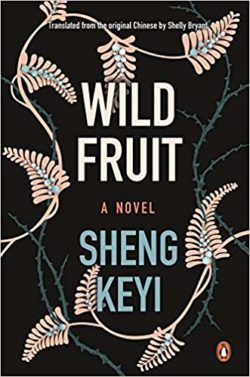Wild Fruit by Sheng Keyi
translated by Shelly Bryant
Penguin Viking, 2019
Publisher's Blurb
At first glance, the Li family looks like any other: one grumpy grandfather, two overworked parents, four siblings, and one small house for them all to live in. Still, with a journalist in the mix, its members can hardly hide their countless misfortunes. Xiaohan, the youngest daughter, shares her family’s unconventional life and exposes the depth of what it means to live in contemporary China today. Through sketches dedicated to each person in the Li clan, she shows how those close to her are forced to find new ways to survive, like wild fruit falling from a tree.
Reading Chinese Network Reviews
Reviewed by Simona Siegel, 24/1/20
 How much pain can one person and family endure? I asked myself this question after turning each page of the book. This book is neither amusing nor inspiring. You don't identify with the main character, you don't feel like jumping on a plane and go immediately to this place. On the other hand, it is very interesting and I believe everybody travelling to China, or studying Chinese culture should read it in order to get a broader image of the society.
How much pain can one person and family endure? I asked myself this question after turning each page of the book. This book is neither amusing nor inspiring. You don't identify with the main character, you don't feel like jumping on a plane and go immediately to this place. On the other hand, it is very interesting and I believe everybody travelling to China, or studying Chinese culture should read it in order to get a broader image of the society.
The whole book is a chronicle of the Li family, with an annoying and cruel grandfather, hard-working and cold-hearted parents and their four children, their partners and children. You secretly judge all of them, see how they make mistakes and the impact it has on the rest of their lives and family. After some time, you don't even judge. You just read in disbelief what is happening. Maybe you tend to like this or that character and start to pity them. But in the end, you just pity them all. The author shows us some of the troubles encountered by common people living in China. Some trying to move from the village to the city, looking for money, happiness and new opportunities. Others staying in the village trying to survive. Gambling, infidelity, physical and mental abuse. It seems as if whichever path they choose, life is not getting any better. After each tragedy that they encountered, I was thinking what else could go wrong? And the author presented even more cruel situations.
I must point out how smoothly the author keeps the storyline in pace without lingering. The whole story is being unfolded in front of our eyes from different perspectives and short stories from lives of different members of the family. Non-existent parental love has turned most of them into bitter grownups unable to have an open relationship with their offspring. Lack of a male successor has affected mothers and daughters. The strict One Child Policy is depicted in the cruelest way (he eventually discovered that the worst curse that anyone could come up with was, “May you die sonless” (p.94)), in contrast with the family of reformed prisoner having the only child - daughter - with a predetermined plan to gather as much money as possible so that she can study abroad.
After the first wave of problems, the arrival of a new daughter-in-law seemed as spring after long cold winter, a new hope for everybody. Even for me, she was my favourite character and I was hoping for a happy ending for her. From the beginning she was different - goal-oriented, hard-working, but most of all - not ashamed of being woman and showing it to everybody (in a good way). She even showed her different approach when talking with the father-in-law about having only one child, even if it was a girl - Father, don't talk about any “future generations”- Thing back three generations - do you even know who those ancestors were? We don't live for others. As long as we live this life well, that's enough, and that's all that matters. Furthermore, I am a woman, and I am also a human. I have my own plans for my life. I am not a child-bearing machine. (p.92)“ .
The whole family seems to be like any other family or people from rural China, the name is not important, the stories are similar everywhere, everybody had to overcome such situations. The vision of earning money and gaining a better future is the main motivation for survival. Leaving grandchildren with grandparents and moving to the city is a problem even nowadays, separating families at their core and breaking the delicate structure of family love.
At the end of the day, the book was depressing and I could not wait to finish reading it, yet could not stop thinking about it, as that much misfortune in one family is just unbearable. On the other hand, it is a collection of problems that people have to face, but do not talk about. Cruel helplessness and injustice. And the author discussed them boldly without unnecessary sentiment or emotional attachment.
Reviewed by Simona Siegel
Reviewed by Vicki Leigh, 27/5/19
 Consumers today demand authentic realism, don’t they? They see through the Instagram filters and the Disney-esque ‘happy ever afters’ they were fed as children. They want real. They want grit. They want the truth behind someone’s story. In Sheng Keyi’s Wild Fruit, set in modern-day Mainland China against the backdrop of the powerhouse cities of Beijing and Guangzhou as they grapple with the influx of subaltern country folk and their wretched lives, the author delivers a hefty dose of reality for those constitutionally strong enough to digest it.
Consumers today demand authentic realism, don’t they? They see through the Instagram filters and the Disney-esque ‘happy ever afters’ they were fed as children. They want real. They want grit. They want the truth behind someone’s story. In Sheng Keyi’s Wild Fruit, set in modern-day Mainland China against the backdrop of the powerhouse cities of Beijing and Guangzhou as they grapple with the influx of subaltern country folk and their wretched lives, the author delivers a hefty dose of reality for those constitutionally strong enough to digest it.
In Yiyang - Sheng Keyi’s own home city in Hunan province - we learn from the opening that narrator Li Xiaohan’s life was never destined for much, as shown by the portrayal of photos of beautiful ancestral relatives, gathering fly faeces and mould, almost as if in humiliation at the present situation that this family’s next generation finds themselves in. From there, it’s rape, suicide, violence, and murder in an unflinchingly tragic narrative that is almost Greek in nature.
I found this novel markedly less ‘punchy’ than Sheng's previous novel Northern Girls, where protagonist Xiaohong’s sheer fortitude gets her hopping from one life situation to the next with a hopeful shred of optimism in the very least. Here, in between sister Li Chuntian praying for her narcissistic, miserly father’s death, and ignored pleas for forgiveness from their father to his own father just before death of the latter separates them, despite references to the magical realism of Gabriel García Márquez, there is very little magic in life to be found for Xiaohan and her family. Indeed, her family have no dignity even in death: they are so poor as to be unable to afford a coffin the correct size for a tall uncle, with his head ‘drooping’ out of the crack in it as it is ‘shoddy and baggy’.
Barely-veiled references to the Chinese authorities make their appearances by way of invasive parasites, such as this from a grotesque depiction of Xiaohan’s elder brother Shunqiu’s experience whilst in prison for his role in a fight: ‘[a cloud of] mosquitoes that form into an egg-shaped worm… [leaving a mans’ entire body covered in blood] and [the victim’s] face swollen to the size of his arse’. Shunqiu further is subject to being a host to ‘blood-sucking worms’ that destroy his healthy cells, leaving him extremely prone to chronic weakness. If prison doesn’t break his spirit, the parasite could help him on his way.
As expected of many contemporary novels coming out of China these days, the theme of sex also has several cameo roles. Xiaohan’s sharp niece Yihua’s innocent sexuality becomes a bargaining chip with the authorities – and it does not end well for her. Men are unable to control their urges after a couple of anaemic ‘pumps’, and a Westerner even gets a look in… but the act is silent, almost like a ‘disease’ they must bear. Women must remain child-bearing sexual playthings, and this is scornfully noted by Sheng Keyi.
Shelly Bryant’s translation nimbly illustrates the hardships of all players, though amidst all the anguish, it is easy to forget about Xiaohan’s own plotline revolving around her journalism and futile feelings for her boss until she actively brings it back around to herself. For readers unfamiliar with Chinese culture and names, it is very useful to have the Li family tree to hand before the novel starts. The decision to separate Shui Qin’s name into two separate syllables when she is married to Shunqiu was also a valuable one, as I can imagine there could be potential for some confusion there if one is not familiar with the sounds of Chinese.
All in all, the novel is far from feel-good, but a terse account of one family that endures more tragedy than the average household. Pixar this ain’t, but Sheng Keyi’s strong prose does shine through all the heartbreak, and she is still a literary force among her modern Chinese literature peers.
Reviewed by Vicki Leigh
Reviewed by Barry Howard, 24/3/19
 Through the lives of an ordinary family we are shown the dark places of modern China. As with her previously translated novel, Northern Girls, Sheng Keyi is surely operating near the boundaries of what the Chinese government will allow to be published. Her political allegory, Death Fugue, clearly went beyond those limits (banned in mainland China). Wild Fruit looks like a return to the edges of censorship, where social criticism can be allowed as long as no finger is directly pointed at the authorities.
Through the lives of an ordinary family we are shown the dark places of modern China. As with her previously translated novel, Northern Girls, Sheng Keyi is surely operating near the boundaries of what the Chinese government will allow to be published. Her political allegory, Death Fugue, clearly went beyond those limits (banned in mainland China). Wild Fruit looks like a return to the edges of censorship, where social criticism can be allowed as long as no finger is directly pointed at the authorities.
Wild Fruit starts with a series of terrible events: death in childbirth, rape, suicide, attempted infanticide, and unjust imprisonment. The rapid movement from one tragedy to the next with minimal context or character development makes for a stuttering start. Perhaps this is intentional. The protagonist (Li Xiaohan) is a journalist and it’s as if she is giving us a bad day of news. First the headlines, then the detail. Soon we do get the depth and much more besides.
Medical quackery, foot-binding, forced abortions and sterilisations; domestic violence, police brutality, and gulags. Confucian hierarchy, patriarchy and ancestor worship. Non-existent rule of law, disputes settled by violence; a mafia society directed by the whim of those in power. Flattery helps, but it’s favours and bribes that get things done. Cold pragmatism means friendships are only worthwhile if they bring financial benefits. That gained from struggle and toil is easily lost through bad luck, accidents, mistakes, or illness.
Even the positives have a flip side. Agricultural developments brought food to the masses, but now it’s covered in pesticides or full of growth hormones. Social mobility saw the children of peasant farmers go to university, but now the competition for exam success sees parents sacrificing their well-being and children unable to cope with the pressure.
Through Li Xiaohan, I think the author wants to highlight how China’s sluggish social development is in stark contrast to the great strides of its economic miracle. The newspaper that Li Xiaohan works for appears modelled on Guangzhou’s Southern Weekly (南方周末). This paper became famous in the 1990s and 2000s for its investigative journalism before eventually being ‘shut-up’ in 2013. I wonder if Sheng Keyi is using this novel to keep alive the reporting on corruption, crony capitalism, and abuse of worker rights. As such it’s relevant across the world, and not just to China.
For all its worth, this novel does suffer from a scattergun approach to exposing society’s ills. For such a multiplicity of misfortune to hit one family renders them almost as caricatures. As such, more becomes less.
What starts off as a family saga ends up more a journalistic notebook. However, it is perceptive and sympathetic. It is also a novel with strong, independent women who take the hard knocks and carry on. There is humour and as it’s a story set in China, it cannot exist without references to food! Overall, a bold and spirited piece of writing that explores large themes and makes small observations that have profound meanings.
Reviewed by Barry Howard
